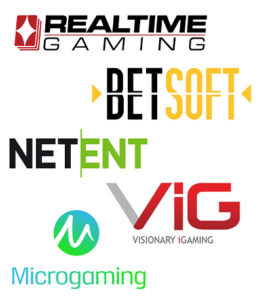Explaining Random Number Generators in iGaming
 Author:
Webster Lupton
| Last Updated:
November 18th, 2025
Author:
Webster Lupton
| Last Updated:
November 18th, 2025
Fairness should be the hallmark of any online casino, and an RNG casino makes game fairness a priority. This page explores RNGs (random number generators) and the basics of how they work, how they are tested, and the top game makers who employ them. Read on, and learn more about fairness in online games and casinos.
Nerd Picks of the Month
-
-
-
-
+4 more
-
-
-
-
+9 more
-
-
-
-
+12 more
-
-
-
-
+5 more
-
-
-
-
+7 more
What is an RNG?
Random number generators, as the name implies, are simply tools that generate random numbers. There are two types of RNGs: pseudo RNGs, which are software algorithms, and true RNGs, which are hardware or mechanically generated.
They each have their own scientific or security purposes, but pseudo RNGs are the types used by casino game providers to produce the random outcomes of the online casino games we play. An RNG makes each deal or spin of these games totally unpredictable.
RNGs are everywhere. Your state lottery employs a pseudo RNG when picking your numbers for you at the cash register. If you want to come up with your own numbers, you can go to an online RNG and put in a range like 1 to 70, and the random number generator will spit out five numbers within the range. Then the lottery uses a true or mechanical RNG (jumbling balls in a container) to choose the winning set of numbers.
Random number generators are also used to simulate weather patterns, traffic flow, financial markets, and other unpredictable situations. And RNGs are security tools; the verification number you get when you sign into a website is randomly generated.
How Random Number Generators WorkHow Random Number Generators Work
What is an RNG game, and what goes into it? The pseudo RNGs that game creators use take a seed value that generates a new number through a mathematical formula or algorithm.
For instance, the middle-squares formula takes a seed value like 51, multiplies it by itself (2601), and uses the middle two numbers (60) of the result as its next seed value to again be multiplied by itself to generate a new number, and on and on. But a two-digit seed value, a sequence will repeat, or generate the same number, more frequently. Larger seeds take longer to repeat. A four-digit seed can create more than 10,000 different numbers, and even larger seeds make it impractical, if not impossible, for any person or computer to solve.
Random Number Generators in the CasinoRandom Number Generators in the Casino
When applied to online casinos, RNGs translate into totally random outcomes for slots, card games, dice games, video poker, and other games. The mechanical slot machines of the 1930s used a spring-driven spinning blade to produce a random outcome. But, after World War II and the development of computers, pseudo RNGs were used more for many purposes. As computers became more complex, so did random number generation.
Now, with online casino slots, you click a button, and an RNG algorithm generates images that appear on the reels that produce a win or loss. It works the same way with other online games, but with different values for the outcome limitations (six sides to dice, 52 cards to a deck, etc.).
Live dealer games, of course, don’t need random number generation because of the human element and the built-in randomness of the game itself. As such, live dealer games, such as blackjack, are vulnerable to a level of predictability through card counting.
Popular RNG ProvidersPopular RNG Providers
Dozens of game software providers employ RNGs to ensure random and fair outcomes. They are the companies that create and design games and set up RNG algorithms and return to player (RTP) percentages. The RNG algorithms embedded in the games are also stored in a remote gaming server where they cannot be influenced.

Some of the most popular providers are:
- Microgaming
- Betsoft
- Playtech
- NetEnt
- BGaming
- RealTime Gaming
- Visionary iGaming
So, where does the house edge or RTP come in? Before putting in an RNG, the game provider determines a range of RTPs for a game. The ranges are usually 93%-97% for slots and higher for roulette, video poker, and card games. Then the RNG is configured to conform; over the long run (thousands of rounds) the theoretical RTP matches the planned one.
Testing RNGs for FairnessTesting RNGs for Fairness
Game providers and online casinos usually turn to an independent third party for certification that the RNGs work and the games are fair. The testing organizations run games through a variety of statistical evaluations and simulations that prove games’ RNGs are truly random and RTPs are as stated.

Here are the top testing agencies and the names you should look for when seeking a truly fair casino:
- BMM Testlabs
- iTech Labs
- Gaming Labs International (GLI)
- eCogra (eCommerce Online Gaming Regulation and Assurance)
Some game software companies have introduced provably fair games that even allow players to test the fairness of any spin or deal. This takes some mathematical expertise, but essentially the player gets a server seed, uses an algorithm to hash the seed, and the platform reveals the original unhashed seed for comparison. The player compares this seed against the hashed version received earlier to make sure they match.
RNGs Make Online Casinos Fair and Fun
An RNG casino takes a long, extensive road to making games fair, but the technology of random number generators is the biggest element. Our top online casinos employ RNG-tested games, whether it’s for slots, blackjack, or video poker.
Take a spin at one of our top real money casino sites and rest assured you are getting a fair deal.

Webster Lupton is a veteran journalist, editor, author, and gambler. His book, A Place to Play, is a deep-dive on baseball history in North Carolina. Web enjoys camping, birdwatching, and fishing. From North Carolina, he likes betting on college basketball as well as NFL and college football. He’s a lifelong NY Giants fan.








